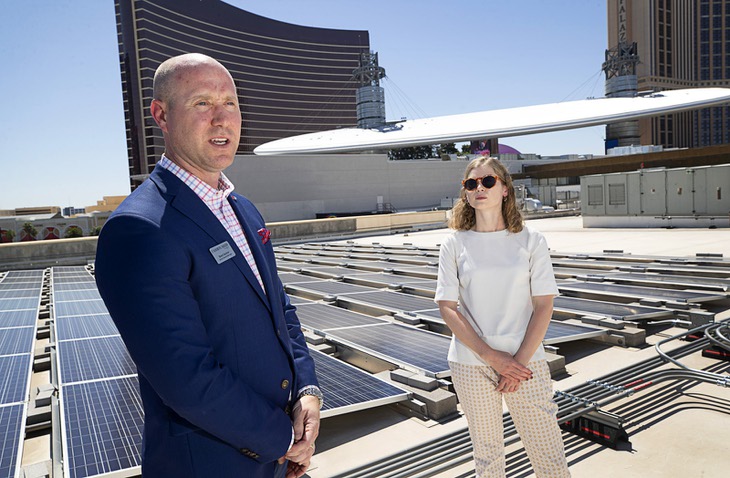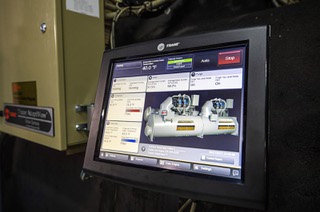Shoppers at Fashion Show mall in Las Vegas may not be aware of measures being implemented to make a greener experience.
Initiatives by the 2.3 million-square-foot shopping center on the Strip include reliance on solar energy, examining its water usage and establishing a new fleet of electric vehicles, officials said while showcasing one of those vehicles last week.
In 2016, Fashion Show installed rooftop solar panels that produce about 1.5 million kilowatt hours per year — about 11% of the 12.1 million kilowatt hours per year the mall uses annually.
Brent Gardner, senior general manager at the mall, said most of the millions of kilowatt hours power the huge venue’s air conditioning system.
“(The) 115-degree summers certainly require power to keep about 2.3 million square feet cool,” he said.
Most of the flat, available space is covered by 3,600 solar panels except on the eight anchor stores’ roofs. Gardner said those roofs are owned by each individual chain.
“We covered all of the common roof that we control,” Gardner said.
Rhianne Menzies, director of ESG at Brookfield Properties, which operates the Las Vegas mall, said 50 of the company’s 683 properties utilize solar panels. According to a fact sheet from Brookfield, those panels generate about 54 million kilowatt hours of renewable energy each year.
“There is a huge value case for it, because we’re able to get those federal tax subsidies or grants around production,” Menzies said. “A lot of the time now, solar is generating cheaper electricity, so we get the environmental part of it, but there is value as well.”
Menzies said Brookfield is working on building a solar power storage battery at Willowbrook Mall in Wayne, N.J.
“It’s a lot of upfront investment, but then we also do get value creation,” Menzies said. “We always look at everything from the full value case, environmental impact, cost, savings, etc. So we’re willing to put capital in where it makes sense for our properties.”
In June, Fashion Show purchased its first electric vehicle to be used for security. The plan is for the Hyundai Kona to be operational this month after it’s outfitted with branding, a light bar, public-address system and license plate cameras.
The vehicle will charge overnight at one of the mall’s 10 charging stations, which were installed in 2019.
“That way we can reduce and remove fossil fuel consumption through that fleet,” Gardner said.
Gardner said the mall uses roughly 80 million gallons of water per year, a good chunk of which gets consumed by the mall’s HVAC cooling tower — about the size of a double-decker bus.
Gardner said he and Menzies have discussed what it would take to use recycled graywater for the air conditioning system instead of municipal water, but it’s just an idea for now.
Graywater is household wastewater from sinks, bathtubs and washers. It differs from blackwater, which is wastewater from toilets.
“It’s something we think about at all the properties, but I think it’s even more relevant with the environment we’re in,” Menzies said.
Gardner said the water would still need to be treated even if it wasn’t potable, because engineers would have to interact with it daily.
“I won’t say the technology is too early, but all the factors that go into it to make sure we can do it, it’s reliable, the business side of it then takes over to determine whether or not it’s a viable project,” he said.

